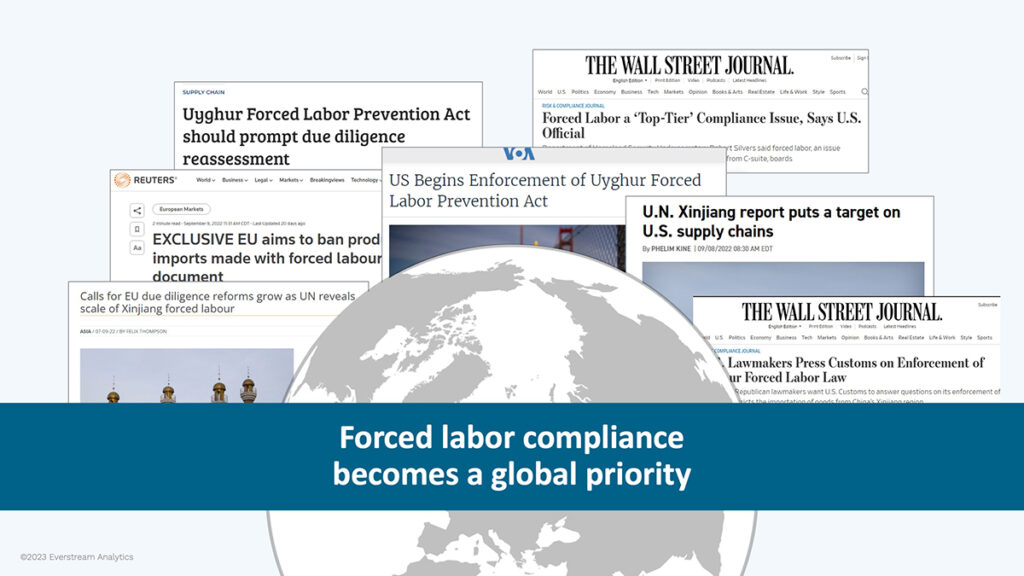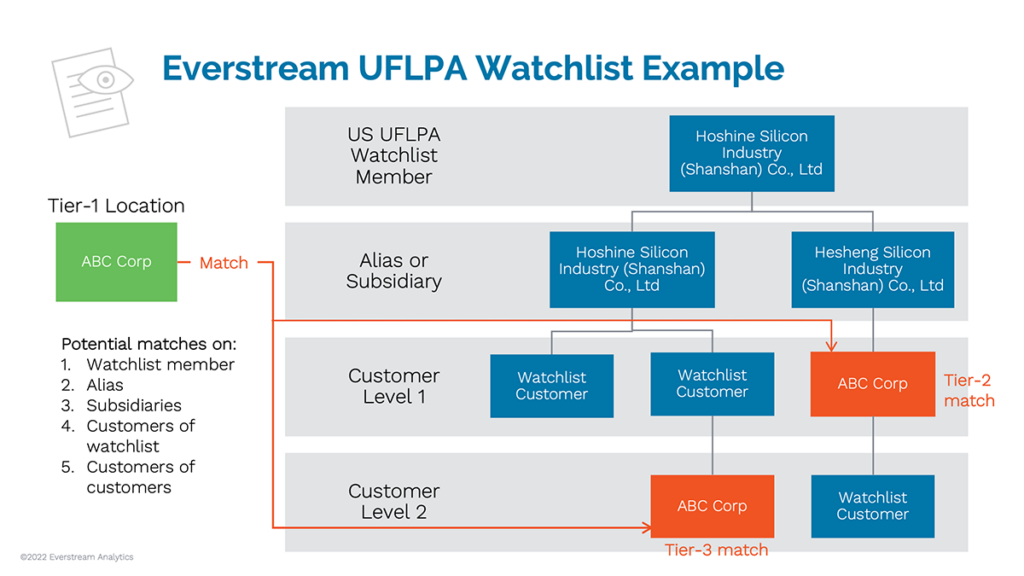Although the U.S. government passed the Uyghur Forced Labor Prevention Act (UFLPA) in 2020, many companies are still scrambling for UFLPA guidance. Not only has the U.S. border patrol seized a stunning amount of product in relation to forced labor violations, but other countries have either already passed or are planning similar legislation.
The treatment of the Uyghur people in China came under scrutiny from governments and organization after reports of forced labor and human rights violations in Xinjiang, where most Uyghurs live. Similar public scrutiny pushed legislation in Germany, the E.U., and other regions.
The UFLPA is also important because it is a forerunner to worldwide efforts to address a serious human rights issue, and other laws are following. In this blog post, we will provide guidance on the UFLPA and what it means for businesses and organizations that operate in the United States.
What is the Uyghur Forced Labor Prevention Act?
The UFLPA is a piece of legislation that was signed into law by President Trump in June 2020. The act aims to address the issue of , where it is believed that Uyghur Muslims and other ethnic minorities are being subjected to human rights violations, including forced labor.
The Act prohibits companies from importing goods that are produced in Xinjiang, assuming that they were fabricated using forced labor. Even if a company does not do business in China, the UFLPA requires disclosing information about their supply network to ensure that they are not using forced labor somewhere else in their operations.

Figure 1. News headlines offering UFLPA guidance highlight growing attention to labor violations worldwide.
The UFLPA is applicable only to U.S. based companies, which gives them a head start on building a robust compliance program that can adapt to any worldwide supply chain human rights laws.
Guidance on UFLPA requirements
The UFLPA imposes several requirements on businesses and organizations that import goods into the United States. The three primary and most impactful requirements are:
- Disclosure of supply chain information
- Certification of compliance
- Prohibition of importation of certain good
Disclosure of supply chain information
Companies are required to disclose information about their supply chains to ensure that they are not using forced labor. This includes information about the origin of the goods, the entities involved in the production process, and any measures taken to ensure that forced labor is not used.
Certification of compliance
Companies are required to provide a certification of compliance with the UFLPA. This certification must be provided to U.S. Customs and Border Protection (CBP) and must include information about the steps taken to ensure that forced labor is not used in the production of goods.
Prohibition of importation of certain goods
The UFLPA prohibits the importation of certain goods that are produced in Xinjiang using forced labor. This includes goods made from cotton, textiles, and tomatoes.
Guidance on non-compliance consequences
As we’ve already seen in recent news reports, non-compliance with the UFLPA can result in significant consequences for businesses in violation. Product, materials, and other goods may be seized at the border and the organization can face fines or other penalties – in Q1 2023 border protection officials seized or held nearly $1B in goods and materials related to UFLPA enforcement.
In addition to legal consequences, companies in violation of the law can also face reputational consequences. Watchdog organizations, news media, and interested citizens may uncover a distant connection to forced labor, likely in a sub-tier of a company’s supply chain, and publicize that discovery. Public backlash can do serious damage to brand reputation.
Guidance on UFLPA compliance
Companies should consider UFLPA compliance as a first step toward aligning with other global human rights supply chain laws. There are a few steps that companies can take to comply with the UFLPA while also laying the groundwork for a worldwide compliance strategy. These steps include:
- Conducting due diligence on supply chains
- Implementing robust programs
Conducting due diligence on supply chains
Businesses should conduct due diligence on their primary and sub-tier suppliers – and use technology to go deeper than surveys – to ensure that they are not using forced labor. It’s not a one-time process. Monitoring includes conducting regular audits of suppliers and ensuring that they are adhering to ethical standards.
Implementing robust programs
Compliance is a company-wide effort, and one that should be taken seriously throughout the organization. Businesses must create robust compliance programs which include ongoing employee training on the requirements of applicable laws. The organization also must create processes to detect and address any issues related to forced labor.

Figure 1. Everstream’s platform can identify and monitor UFLPA risk hidden in a company’s sub-tier supply network.
UFLPA guidance is for long-term success
Any law can be complex and difficult to follow without investing massive resources. But compliance with the UFLPA will pay off in the long-term as more global supply chain laws emerge. Even if UFLPA doesn’t apply to your organization, one of the other laws either already does or will soon. Get started today, and use the UFLPA to get started on building your organization’s long-term compliance strategy.
Get more UFLPA guidance in our UFLPA webinar